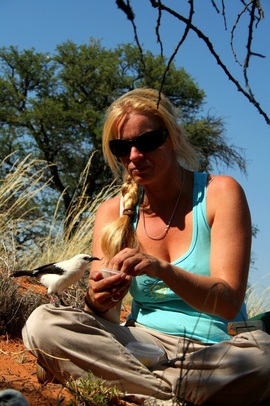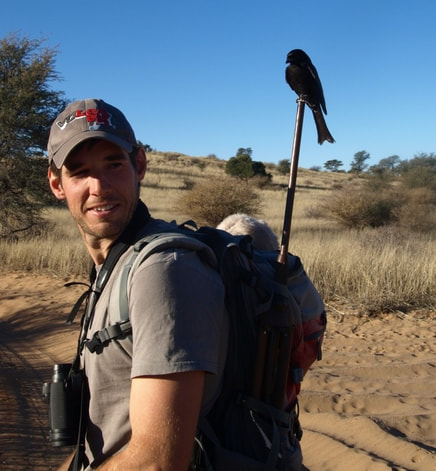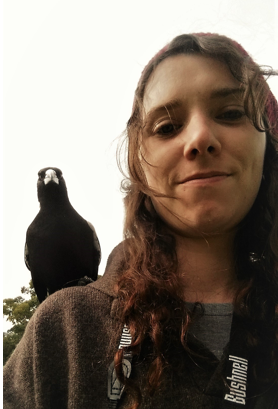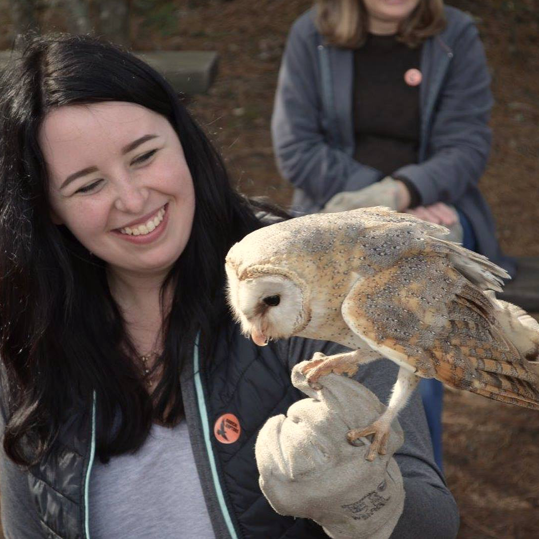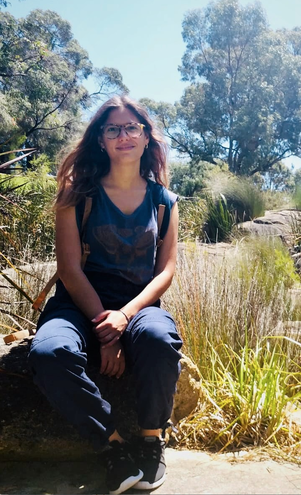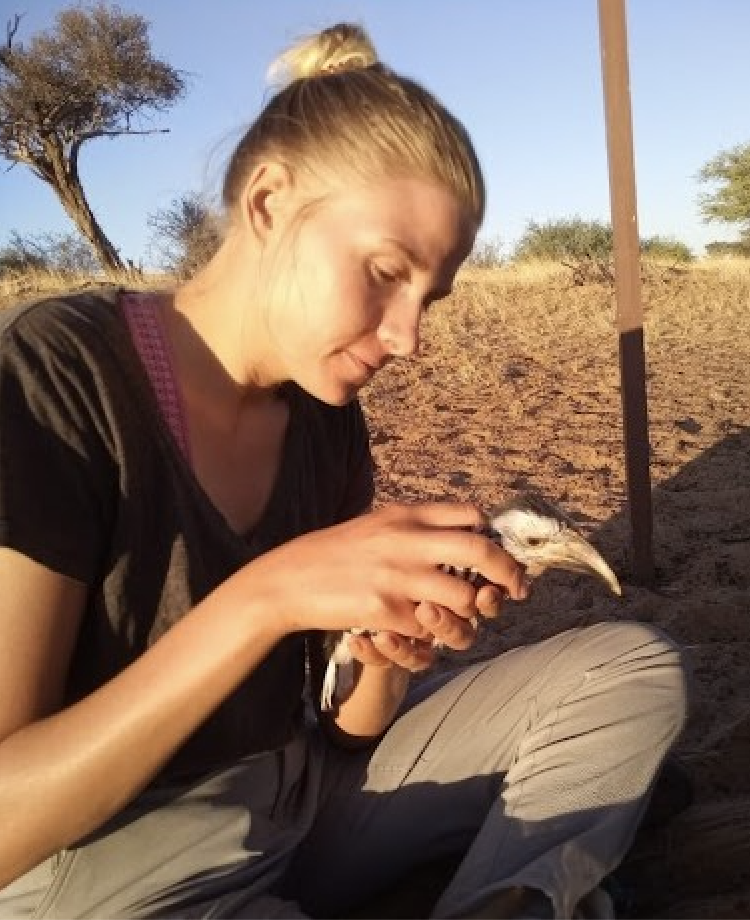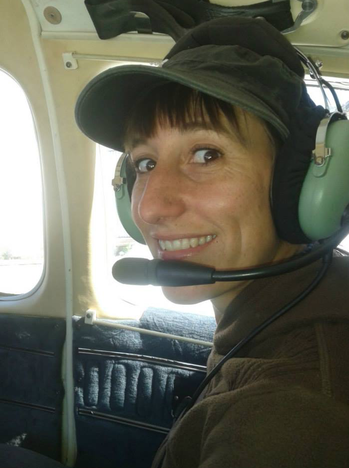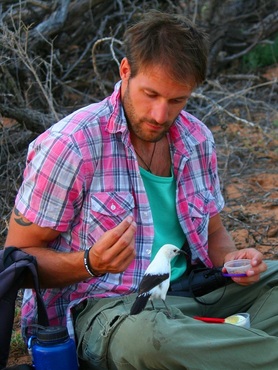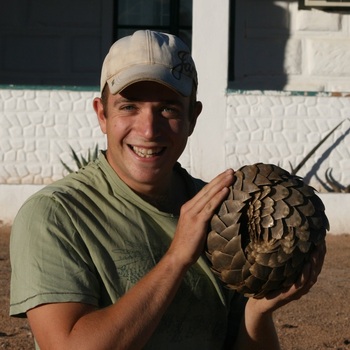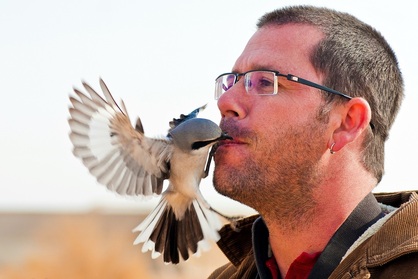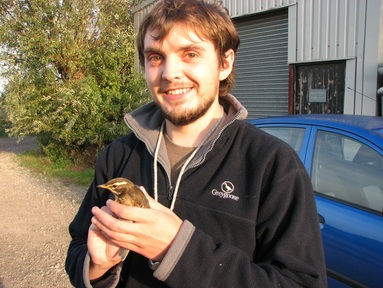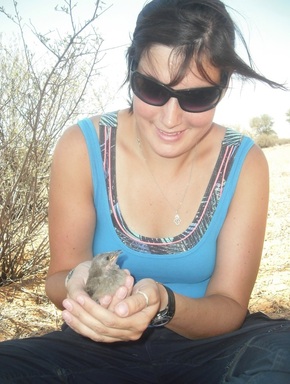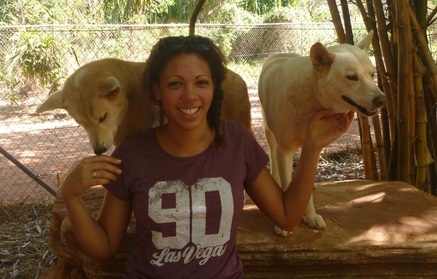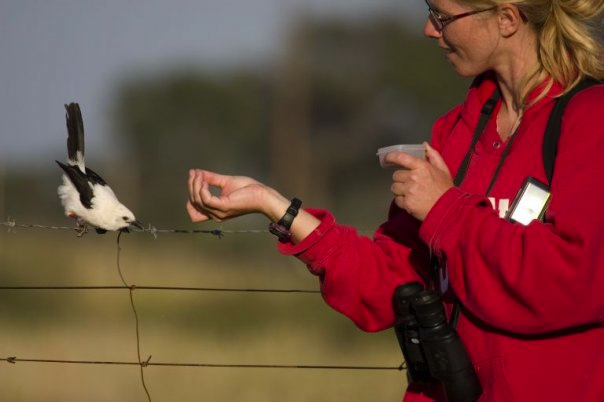Associate Professor Amanda Ridley, Principal Investigator, Pied Babbler Research Project & Western Magpie Research ProjectUniversity affiliations: University of Western Australia & the Percy FitzPatrick Institute, University of Cape Town
Brief biography 1999-2003 PhD (Arabian Babblers), Cambridge University (Supervisor: Prof T.H. Clutton-Brock) 2003-2004 Postdoctoral research fellow, Newnham College, Cambridge University 2005-2009 Postdoctoral research fellow, Percy FitzPatrick Institute, University of Cape Town 2009-2012 Lecturer & MQRF, Macquarie University 2012-2016 ARC Future Fellow, University of Western Australia 2016-present Associate Professor, University of Western Australia I have been collecting data on the causes and consequences of cooperative behaviour in pied babblers since 2003. My current primary interests are: the causes of variation in contributions to cooperative care, the short- and long-term consequences of helping behaviour (to both the helper and the individual being helped), and how to measure the cost of help. Additionally, I am interested in sexual selection and how that operates in a cooperative species where sexual monogamy prevails and breeding spaces are extremely limited. Specifically, I aim to determine the importance of mate versus rival assessment, and how mate quality affects dispersal and eviction patterns in cooperative species. An additional aspect of my research involves understanding interspecific interactions and communication. Originally I started investigating these interactions between pied babblers and fork-tailed drongos. More recently, I have begun investigating interspecific interactions in scimitar-bills, yellow-billed hornbills and wattled starlings. The recent arrival of brood parasitism in our study population has caused me to be intensely interested in the relationship between a brood parasite and its cooperative host, and this research is planned for the next few years. With the help of a new research grant, I am beginning research on understanding long-term population dynamics in cooperative species, including factors that promote the expansion or extinction of groups. I will be using the long-term datasets of Arabian and pied babblers to determine the influence of climatic changes (heatwaves and droughts) on social dynamics at both the group and population level |
Dr Martha Nelson-Flower, Collaborator, Pied Babbler Research ProjectUniversity affiliations: Langara College, Percy FitzPatrick Institute, University of Cape Town
I grew up in Vancouver, Canada, and received my B. Sc. (Animal Biology) from The University of British Columbia in 1999. I then delved into the fascinating world of the chloroplast genome of the dinoflagellates, a group of unicellular marine eukaryotes, and received my Master’s of Science in 2003. Although I found protistology absorbing, I was more interested in the behaviour of larger animals and went to the Kalahari Meerkat project as a volunteer for a year in 2004. Once there I realized that my future lay in the field of behavioural ecology, and specifically in the intersection of behaviour with genetics. I began my PhD on southern pied babblers at the University of Cape Town at the Percy FitzPatrick Institute of African Ornithology in 2006. I investigated kinship between group members, and among individuals in the wider population, and the implications of relatedness for decisions regarding dispersal, mate choice, reproductive conflict and helping in the group. I was supervised by Amanda Ridley, Phil Hockey, Colleen O’Ryan and Morné du Plessis. My thesis, completed in 2009, received UCT’s Purcell prize. I am currently a post-doctoral fellow at the University of Cape Town and working on projects that use genetic data to answer behavioural and conservation questions. I am investigating the wider southern pied babbler population to understand past responses to climatic stress and identify regions that may contain future refugia for the species in the event of climate change. I am also continuing work from my PhD and using relatedness data from the Pied Babbler Research Project population to answer questions about subordinate reproductive success, immigration and helping. |
Dr Tom Flower, Collaborator, Drongo Research ProjectUniversity affiliations: Capilano University, Simon Fraser University, Percy FitzPatrick Institute, University of Cape Town
From 2003 to 2007 I worked at the Kalahari Meerkat Project, first as a volunteer and then as field site manager. During this time I also completed an MSc (Univ. Pretoria) investigating competition for food in meerkats. In 2008 I began a PhD at the University of Cambridge studying the deceptive communication strategies of the fork-tailed drongo, a bird which uses false alarm calls, including mimicked alarms, to steal food from other animals. This research continued work begun by Dr Amanda Ridley on the drongos that interacted with the pied babblers (and Meerkats) at the Kuruman River Reserve. I recently began a postdoctoral research fellowship at the Percy Fitzpatrick Institute continuing the drongo research outlined below. At present my main research interests are twofold. Firstly, I am investigating whether drongos use feedback from their host species behaviour to strategically modify their deceptive tactics. I hope that this research will illuminate the important role that feedback may play in animal communication systems. Secondly, I am investigating how drongos acquire their false alarm calling strategy. I hope that this will provide insight into the mechanisms that enable animals to produce apparently ‘complex’ communication strategies. The drongo study population affords an excellent opportunity to investigate interspecific interactions. I am particularly interested in eavesdropping behaviour, whereby animals listen to other species alarm calls, and vocal mimicry; determining how drongos learn to mimic other species alarm calls in alarm contexts, could help us understand such behaviour. I am also interested in investigating the costs and benefits of interactions between drongos and sociable weavers, which frequently associate when foraging and appear to actively seek each other out. Finally, I am excited about upcoming research on drongo brood parasitism by African cuckoo, which will be undertaken in collaboration with Dr Amanda Ridley. External links: Percy FitzPatrick Institute, University of Cape Town http://www.fitzpatrick.uct.ac.za/docs/tom.html Capilano University https://www.capilanou.ca/biology/bios/Thomas-Flower/ |
|
Mylene Dutour, Postdoctoral Researcher, Western Magpie Research Project
University affiliations: University of Western Australia I am a behavioural ecologist who is interested in how different species use acoustic signals during collective and social behaviours. I completed an MSc in sciences at the University of Lyon (France) in 2015 under the supervision of Dr. Thierry Lengagne and Dr. Jean-Paul Léna. I specifically investigated the mobbing behaviour (harassing a predator to drive it from the area) of passerine birds against the Eurasian pygmy owl (Glaucidium passerinum), a predator specialized in passerine birds. Following this, I began my PhD studying the acoustic communication systems of the passerine birds during mobbing. Specifically, my research has focused on how species encode information in their mobbing calls, how conspecifics and heterospecifics respond to mobbing calls, the mechanisms and the extrinsic factors explaining these responses. Currently, I am a post-doctoral fellow at the University of Western Australia and working on the project that examines the positive relationship between cognition and fitness in Western Australian magpies (Cracticus tibicen dorsalis). I am conducting experiments to determine if smarter females are better at protecting their young, or provision their young with better quality food. More recently, I have begun to investigate information transfer between magpies and heterospecifics during mobbing and the singing behaviour in magpies. |
|
|
Sarah Walsh, PhD Student, Western Magpie Research Project
University Affiliations: University of Western Australia I received my BSc in Conservation Biology and Zoology from the University of Western Australia in 2016, and then completed my honours in 2017 under the supervision of Kate Morgan, Simon Townsend, and Amanda Ridley. My honours thesis focused on investigating the potential for compositionality in the acoustic structure of call combinations in the Western Australian magpie (Cracticus tibicen dorsalis). My PhD is a continuation of my honours research and will focus on investigating the occurrence, use, function and benefit of call combining in Western Australian magpies, under the supervision of Sabrina Engesser, Simon Townsend and Amanda Ridley. I am particularly interested in exploring intraspecific variation and its relationship with social complexity in the development, use and function of call combinations. Therefore the aims of my PhD are threefold; firstly I aim to empirically verify compositional structure through use of behavioural observation, audio recording and playback experiments. Secondly, I will look into the ontogeny of call combinations, which to date has received very little empirical investigation. In doing so, I aim to gain insight into the development of combinatorial capacity in juveniles, whether this is a learnt or an innate capacity, what affects inter-individual variation in development and the role of sociality in such variation. Finally, I will focus on the interaction of the social environment with communicative complexity at both the group and individual level. Within this section, I will investigate whether individuals from more socially complex environments use a greater diversity of call combinations more frequently due to the inherent requirement for greater communication exchange in more socially complex groups. Within this study, I aim to shed light on the potential selective conditions (e.g. social complexity) that may have driven the occurrence of call combining in non-human animals, which in turn may give insight into the largely elusive evolutionary history of combinatoriality in human language. |
|
|
Elizabeth Speechley, PhD student, Western Magpie Research Project
University affiliations: University of Western australia I received my BSc in Zoology at the University of Western Australia in 2016 and completed my honours the following year where I investigated the role of polyandry as an inbreeding avoidance mechanism in guppies. Following the completion of my honours I worked as a research assistant at the University of Western Australia for Dr Clelia Gasparini and collaborated with Dr Stephanie King on a project investigating the function and categorisation of bottlenose dolphin burst-pulses. My research interests are rooted in behavioural ecology, specifically the relationship between sociality, cognition and communication. Cognition represents a fundamental component of an individual’s ability to successfully navigate their physical and social environment. However, we still lack a thorough understanding of the mechanisms underpinning cognitive development. My research will provide unique insight into the relationship between sociality and cognition in a wild population, whilst also investigating how cognitive performance extends to an individual’s ability to communicate effectively within their social group. My PhD, supervised by Mandy Ridley & Ben Ashton, builds on the work started during Ben’s PhD on the Western Australian magpie (Cracticus tibicen dorsalis). This research found a robust association between group size and cognition, with individuals living in larger groups exhibiting increased cognitive performance compared to those in smaller groups. My research uses cognitive testing and social network analysis to investigate whether this group size-cognition relationship is driven by the complexity of intragroup interactions. I will also conduct vocal analyses and playbacks to investigate whether the group size-cognition relationship is underpinned by the need to communicate effectively in large groups. |
|
Camilla Soravia, PhD student, Pied Babbler Research Project
University affiliations: University of Western Australia I completed my MSc in Evolutionary Biology in 2017 at the University of Padova (Italy). My Master’s thesis investigated how variation in food supply affects parent-offspring and sibling-sibling interactions in lesser kestrels (Falco naumanni). I then did an Erasmus traineeship at the Experimental Station of Arid Zones (Almeria, Spain) under the supervision of Jesús Avilés. Here, I investigated the potential signalling role of achromatic displays in a species with nocturnal habits, the Mediterranean storm petrel (Hydrobates pelagicusmelitenisis), and I worked as a field assistant on a project on colour polymorphism in scops owls (Otus scops). Currently, I am investigating the relationship between heat stress and cognition in pied babblers, under the supervision of Amanda Ridley and Benjamin Ashton. It is well known that heat stress impairs cognitive performance in humans. Given the growing evidence of a direct link between cognition and fitness, it is crucial to determine whether heat stress affects cognition also in wild animals, if we are to understand how they may flexibly adjust in the face of global warming. In my PhD project, I present individuals with a battery of four cognitive tasks testing domain-general cognitive traits: associative and reversal learning, inhibitory control and spatial memory. To assess the effect of heat stress on cognitive performance, I test individuals under both normal conditions and heat stress conditions, identified by the display of heat dissipation behaviours. I then use the exceptional 15-year-long individual life-history record to explore the link between individual cognitive performance and fitness correlates, such as age at acquisition of dominance and number of offspring raised to independence per year. |
|
Grace Blackburn, PhD Student, Western Magpie Research Project
University affiliations: University of Western Australia I graduated with my BSc in Veterinary Science from Murdoch University in 2016 before moving over to the University of Western Australia to undertake my masters with Amanda Ridley and the Western Magpie Research Project in 2018. My thesis investigated the effects of heat stress on the cognitive performance of Western Australian magpies (Cracticus tibicen dorsalis). Following my masters, I worked as a research assistant for the Pied Babbler Research Project in South Africa, and for a number of other projects around Western Australia. For my PhD, under the supervision of Amanda Ridley and Benjamin Ashton, I am investigating the social and anthropogenic factors surrounding individual variation in cognition. My research focuses on the effects of anthropogenic noise on wild Western Australian magpies, and how cognition may help individuals overcome these effects. I am also investigating how extra-group aspects of sociality may influence cognition. My research uses a combination of observational focals, audio recordings and analysis, playback experiments, and cognitive tests to investigate how social factors affect cognition, and how cognition in turn helps magpies cope with anthropogenic noise. Amanda Bourne, PhD Student, Pied Babbler Research Project and Hot Birds Research Project
University affiliations: FitzPatrick Institute for African Ornithology, University of Cape Town I completed a Masters' degree at the University of Cape Town in 2008, focusing on land use and agriculture. At the end of my studies, I worked as a farmer and gardener in the United Kingdom for two years before returning to South Africa where I was employed briefly as a researcher back at the University of Cape Town. I joined the South Africa office of Conservation International in 2010 and worked on a range of climate change adaptation and mitigation projects over the next 6 years. I started my PhD on Southern Pied Babblers in 2016, based at the FitzPatrick Institute at the University of Cape Town. I am particularly interested in identifying tipping points and critical thresholds in hot, dry environments. Arid zone species, such as the babblers are really interesting because they are already well adapted to drought, heat stress, and other climatic extremes, and may therefore be more resilient to the impacts of global than some other species. Nontheless, there are considerable lethal and non-lethal costs of repeated exposure to environmental stress, with the potential to cause significant cumulative declines in condition and productivity over time. In my PhD, supervised by Susan Cunningham, Amanda Ridley, and Claire Spottiswoode, I am bringing together two interesting biological questions: 'Why be social?' and 'What underlies species vulnerability to climate change?'. I am studying the impact of high temperatures on behaviour, energy expenditure, reproduction, and survival in the babblers, and investigating the extent to which, if at all, cooperation and group living can provide a buffer against negative impacts of heat stress. |
|
|
Alex Thompson, PhD student (graduated), Pied Babbler Research ProjectUniversity affiliations: Percy FitzPatrick Institute, University of Cape Town
I received a BA (Hons) in Natural Sciences from Cambridge University in 2007, then spent a year at the Kalahari Meerkat Project, followed by six months assisting in the setting up of a study population of Southern Yellow-billed Hornbills (Tockus leucomelas). The main focus of my research is the conflicts that occur within family groups; both between care-givers and offspring, as well as between siblings. Previous investigations of conflicts and their resolutions in avian research have focused on nestling birds, due to the difficulties of following birds once they have fledged. This has left a major period of offspring development under-studied, and pied babblers offer a perfect system in which to investigate these conflicts. A major component of my research is focused on understanding how the mobility of offspring changes the dynamics of begging, both from the perspectives of care-givers and offspring. I am also investigating a novel manifestation of parent-offspring conflict: the conflict over the location of poorly mobile fledgling. The other areas of my research investigate the signalling that fledglings use to covey need and quality, whether it be acoustic or through their plumage development. Recently, I have been collaborating with Mandy Ridley to investigate the interspecific interactions that pied babblers have with other Kalahari birds. To date this work has focused on Cuckoo-host interactions between pied babblers and Jacobin cuckoos (Clamator jacobinus), and the competition between pied babblers and the nomadic wattled starling (Creatophora cinerea) over nest locations. More recently we have begun to investigate information transfer between pied babblers and scimitar-bills (Rhinopomastus cyanomelas), and the way in which pied babblers facultatively adjust their alarm calls to predators depending upon their reproductive stage. Click here to visit Alex's personal webpage |
Dave Humphries, PhD student (graduated), Pied Babbler Research ProjectUniversity affiliations: Macquarie University
After completing my degree (a BSc (Hons) in conservation biology and ecology) at the University of Exeter, I spent one and a half years working as a research volunteer at the Kalahari Meerkat Project in the Northern Cape, South Africa. I am now a PhD student at Macquarie University, Sydney, under the supervision of Dr Amanda Ridley, Dr Matt Bell and A/Prof Simon Griffith. My current work on the Southern pied babbler is looking at how group members recognise one another and the implications this has for their social behaviour. Using a series of playback experiments I am investigating whether they are able to individually recognise each other’s vocalisation. I also look at when group member recognition develops in young birds, a factor which may be crucial in explaining life history events such as kidnapping. In addition I look at how responses to the vocalisations of previously familiar individuals change over varying periods of continued separation. This may help to explain observations of prospecting and dispersal in this species. Other work includes looking at whether the pied babblers are able to recognise kin and how this is affecting their social interactions with neighbouring groups. Click here to visit Dave's personal webpage |
Oded Keynan, former PhD student (graduated) and now research collaborator, Arabian Babbler Research ProjectUniversity affiliations: Macquarie University and Tel Aviv University
Other affiliations: Dead Sea & Arava Science Centre I am 35 years old, married to Adi and father to Mayan & Yaara. I received my BSc. (Honors) from Haifa University in 2005 and my MSc from Tel Aviv University in 2009. My Masters thesis was on the impaling behavior and male-female interactions in the Southern Grey Shrike (Lanius meridionalis) at the Shezaf Nature Reserve in the Negev desert of Israel, my supervisor was Prof' Amotz Zahavi. At the moment I am a second-year PhD candidate in a joint supervision program (cotutelle) between Tel Aviv University, Israel and Macquarie University, Sydney, Australia, and I also work as the director of the Arava birding center in the Dead Sea & Arava Science Centre. My thesis title is "The effect of group size and composition on individual behaviour, group dynamics and population regulation in the Arabian Babbler (Turdoides squamiceps)" and my supervisors are Prof Arnon Lotem and Dr Amanda Ridley. My research aims to explore the relationships between individual development and behaviour, group size, and population dynamics in the cooperatively breeding Arabian Babbler (Turdoides squamiceps). To explore these relationships I conduct field experiments and observations on individual foraging success, foraging strategies and self versus social learning. Together with this fieldwork I use the uniquely detailed 40-year Arabian babbler database to analyze long-term demographic effects. This database work involves finding what social or environmental factors promote group growth or extinction, and identifying critical group size effects in relation to eviction, dispersal and reproductive conflict behaviour. Click here to visit Oded's personal webpage |
James Westrip, PhD student (graduated), Pied Babbler Research ProjectUniversity affiliations: Edinburgh University
I received my BA (Hons) from the University of Cambridge in 2011, and spent the following year working as a volunteer research assistant for Dr. Claire Spottiswoode in the Behavioural Ecology group at Cambridge. My research interests are centred on avian social and breeding behaviour, and during the course of my PhD (supervised by Dr. Matt Bell & Dr. Per Smiseth) I hope to investigate intra- and interspecific signalling and communication in the Southern pied babbler. Utilising playback and feeding experiments I aim to ascertain the amount of information use by babblers in a social context. Using the sentinel system of the babblers I will investigate whether they make adjustments to personal contributions this public good given the state of others, and also investigate whether alarm caller reliability is monitored by other group members. Additionally I intend to explore the role of vocalisations in the context of nestling provisioning, investigating whether nestling provisioners transfer information from the nest site to the foraging group, which may be several hundred metres away. Finally, I will be undertaking observational work to see which other bird species may be found around babbler groups, and exploring whether the babblers utilise information from heterospecific sources when making foraging decisions using playback experiments. |
Sabrina Engesser, former PhD student (graduated) and now research collaborator, Pied Babbler Research ProjectUniversity affiliations: University of Zurich
I received my BSc in Biology in 2009 from the University of Kaiserslautern. In 2011, I completed an MSc in behavioral sciences at the University of Zurich under the supervision of Prof. Marta Manser. I specifically investigated the adaptive function of meerkats' (Suricata suricatta) close calls - a contact call frequently emitted during foraging - in group cohesion and spacing behaviour. After my Masters, I worked as a research assistant for Prof Marta Manser, investigating the relationship between acoustic features of the human voice and psychological as well as physiological traits. For my PhD I will investigate the occurrence of call combinations in pied babblers' vocal repertoire, under the supervision of Dr. Simon Townsend. Specifically, I am interested whether pied babblers combine meaningful call types into meaningful compositions and if there exist any rules governing the formation of such syntactic compositions. To do this, I will combine behavioural observations and audio recordings with playback experiments. I will further conduct artificial grammar playback experiments to probe what cognitive mechanisms underlie the production and perception of vocal compositions in pied babblers. With this study I aim to broaden our insight into the evolution of compositional communication - a basic feature by which the generative power of the human language is achieved. |
Elizabeth Wiley, PhD student (graduated), Pied Babbler Research ProjectUniversity affiliations: University of Western Australia
I completed a BSc (hons) in biological sciences at the University of Liverpool in 2007. For my dissertation I researched the effects of the Pleistocene glaciations on genetic diversity within species. I followed this with an MSc in Evolutionary Psychology (University of Liverpool,2008) where I studied aposematism and learning in chicks (Gallus domesticus), investigating whether they will ingest a fixed number of unpalatable (visually defended) prey items, before learning to avoid them. I next worked as a research assistant for the University of Zurich, at the Kalahari Meerkat project (2010-11) where in collaboration with the Zurich research team, I carried out experimental trials on communication and alarm calling in the meerkat (Suricata suricatta). Following this, I worked as a research assistant for Dr Mandy Ridley at the Pied Babbler project (2011- 2013). I carried out playback experiments and collected and analysed sound data from individuals and groups, throughout the breeding seasons. My PhD (supervised by Amanda Ridley & Arpat Ozgul) will involve the study of long-term population dynamics in the Pied Babbler (Turdoides bicolour). I will look at the influence of decision-making and communication on cooperation and conflict resolution at both group and population level, and how this affects susceptibility to extinction in small populations. I will also examine the extent to which reproductive failure and extinction risk are exacerbated or moderated by climate change, in the volatile and arid landscape in which this species occurs . My interests stem from the belief that understanding more about animal behaviour and population dynamics is essential to promote effective conservation biology and population management. |
Dr Benjamin Ashton, former PhD student (graduated) and now research collaborator, Western Magpie Research ProjectUniversity affiliations: University of Western Australia & Macquarie University
I received an MBiolSci in Zoology from the University of Sheffield in 2011, and then spent the following year as a research assistant at the Kalahari Meerkat Project. During this time I met Dr Tom Flower, and subsequently spent 6 months as his research assistant investigating deceptive communication in fork-tailed drongos. Currently, my research interests lie at the interface of behavioural ecology and cognition, specifically the relationship between cooperation, cognition and fitness. Whilst both cognition and cooperation have been extensively studied for several decades, the relationship between the two is not well understood. My PhD will investigate the relationship between cognitive ability and social complexity, using a ringed and habituated population of Australian magpies, Cracticus tibicen, in Perth, Western Australia. The aims of my PhD are threefold; firstly I aim to identify the causes of variation in individual cognitive ability, and determine whether such variation is affected by group size and structure. Secondly I plan to determine how variation in cognitive ability influences the dynamics of cooperation at both the individual and group level, through examining social competence and individual contributions to cooperation. Finally, I want to quantify the fitness consequences of variation in cognitive ability. Supervisors: Amanda Ridley & Alex Thornton |
|
Mel Mirville, PhD student (graduated), affiliated with the Dian Fossey Research Centre
University affiliations: University of Western Australia I received my BSc in Conservation Biology and Zoology from the University of Western Australia in 2012, and in 2013 I completed my honours under the supervision of Amanda Ridley and Jennifer Kelley. For my thesis I investigated the affect of group size on the problem solving abilities of Western Australian magpies (Cracticus tibicen dorsalis). My research interests are focused primarily on exploring the behavioural ecology of animals and applying this knowledge to promote effective conservation practices. Specifically, I am interested in within group relationships and between group interactions, and how these two aspects of social life can impact population dynamics. Currently, I am a PhD candidate at UWA under the supervision of Amanda Ridley, Cyril Grueter and Shane Maloney. My PhD is investigating the social and ecological influences on intergroup relationships in a wild population of mountain gorillas (Gorilla beringei beringei) at the Karisoke Research Center, Rwanda. I will collect baseline behavioural data on fully habituated groups of mountain gorillas from field observations. These data will be used to compare against behaviour during intergroup encounters, which will be observed both in the field and extracted from a long-term database with over ten years of detailed encounter records. This data collection will allow me to investigate why intergroup encounters are so variable, and further examine the effects these interactions on within group behaviours. Additionally, I aim to investigate how the growing population, which has led to a sixfold increase in intergroup interactions, will affect mortality. This research will therefore identify the causes and consequences of intergroup encounters, which are extremely relevant in a growing population that is protected under conservation practices, and contribute to a better understanding of the factors that regulate intergroup dynamics. |
Katherine du Plessis, MSc. in Conservation Biology (graduated), Pied Babbler Research Project
University affiliations: Percy FitzPatrick
Institute, University of Cape Town
I possess a great passion for scientific research and conservation. Having interned at the Pied Babbler Research Project in 2009, I jumped at the opportunity to study the behavioural and physiological effects of temperature on pied babblers for my Master’s Degree. This research was especially fascinating as it combined components of multiple disciplines (climate change, avian biology, behavioural ecology, physiology, and conservation biology) to answer conservation questions. My supervisors on this project included: Amanda Ridley, Rowan Martin, Susan Cunningham, and Phil Hockey. Originally from Green Bay, Wisconsin , I received my B.Sc. in Ecology and Evolution from the University of California, Santa Cruz during which time I participated in numerous projects including: marine ecology research in Moorea, Tahiti, water quality analysis of the Pajaro Watershed, genetics research in the Bernardi Lab, and wildlife care and rehabilitation at WERC and the San Francisco Zoo. During my time at the University of Cape Town I researched the impacts of plastics on the marine environment, which altered my views on conservation. This was also when I met my husband, and fell in love with Africa. Currently, I live in Bermuda where I collaborate with the government and various organizations to promote holistic conservation through the protection of the environment, social welfare, and economic stability. My first paper, co-authored by my supervisors, has been accepted for publication by Global Change Biology. My intention is to publish further aspects of my project in both scientific journals and popular science magazines to contribute to scientific research, raise awareness on the repercussions of climate change, and promote conservation. |
